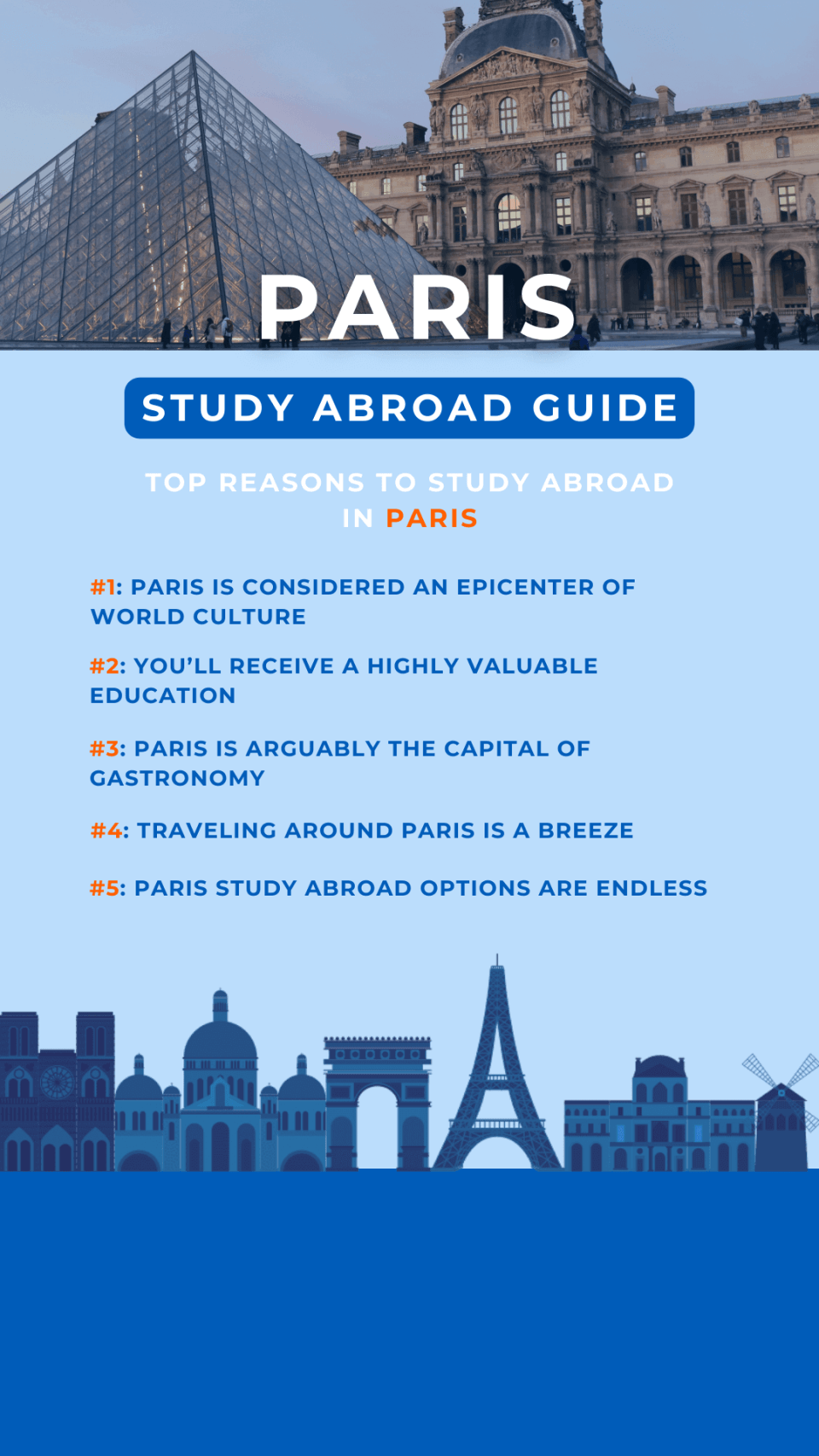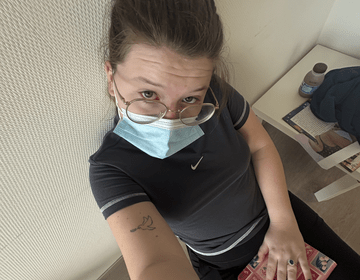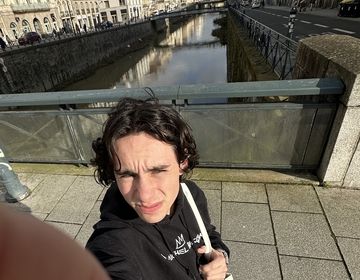The Ultimate Guide to Studying Abroad in Paris
“Paris is always a good idea.” It’s one of Audrey Hepburn’s most famous lines, and it rings true.
As one of the most famous cities in the world, Paris is often referred to as the City of Lights, rich in history, culture, fashion, and the arts. France’s capital is also famous for its high-quality gastronomy, stunning architecture, and world-renowned landmarks. Combined, these qualities make studying abroad in Paris a great idea for any student!
Interested in learning more about why living and learning in Paris is so life-changing? Let’s dig in!

Why Study Abroad in Paris
Situated between water and land routes significant to greater Europe, Paris is known as one of the world’s leading political, industrial, commercial, and cultural hubs.
While the city is home to globally recognized monuments such as the Eiffel Tower, the Louvre Museum, and the Notre Dame Cathedral, it also boasts hundreds of other historical sites, sensational activities, and fabulous restaurants. And they’re all waiting for you to explore them.
A Paris study abroad program is an experience like no other – we promise you that. Read on to learn more about why studying abroad in Paris may just be the perfect choice for you!

Reason #1: Paris is considered an epicenter of world culture.
From architecture, literature, fashion, theater, and so much more, studying abroad in Paris is your opportunity to gain a deeper appreciation for this city’s impact on the globe.
Reason #2: You’ll receive a highly valuable education.
Our Paris study abroad programs are varied – in addition to our Open Campus Block, you have an opportunity to take courses at some of Paris’ historical institutions, including The Université Sorbonne Nouvelle, a branch of The University of Paris, and Université Paris Diderot.
Allowing you to dive deep into courses with a Parisian perspective, The Université Sorbonne Nouvelle is the second oldest university in Europe and is the founder of the first doctoral degree. Université Paris Diderot teaches all disciplines – from arts and humanities to natural sciences.
Reason #3: Paris is arguably the capital of gastronomy.
Paris is considered a dream destination for those passionate about fine cuisine. We promise this tastes as good as it sounds!
From freshly made and authentic croissants, macarons, baguettes, and much, much more, the city’s rich history in cuisine and its art of cooking is world-renowned. In fact, France is home to the most Michelin-star restaurants in the world!
In between classes while studying abroad in Paris, check out some restaurants that are considered essential: Comise, Prunier, Le Bistror Flaubert, and Restaurant Arnaud Nicolas – just to name a few. Trust us when we tell you that Paris is a délicieux treat for your tastebuds!
Reason #4: Traveling around Paris is a breeze.
Paris is incredibly walkable. In fact, many of its top attractions are within walking distance of one another. If you choose to study abroad in Paris, you will be able to access sought-after locations with just a walk and some comfortable shoes.
But for sights that are a bit further afield, Paris’ metro system is highly efficient. The city has six main train stations as well as day trip opportunities to destinations outside of France. Some of these more popular day trip destinations include Brussels, Luxembourg, London, and Amsterdam.
Reason #5: Paris study abroad options are endless.
CIEE offers a variety of Paris study abroad options, including summer programs, a J-term option, 18-week courses, internship opportunities, and Open Campus Blocks. Our Open Campus Block program is specially designed for students who require a flexible study abroad experience; in fact, you can design a journey as unique as you. You’re able to select one, two, or up to three consecutive six-week blocks at any CIEE Open Campus Block location – including the illustrious Paris!
Depending on the program that’s best for you, CIEE also offers a wide selection of courses to study while abroad in Paris. These offerings include language and cultural studies, writing and history courses, a fashion class, and even a course centered around wine!

How to Study Abroad in Paris
Art, fashion, food – what else is there? You’re ready! But before you commit, take note of a few things to have in check before studying abroad in Paris.
Step #1: Check your availability.
We currently offer an array of study abroad programs in Paris with varying lengths – as short as four weeks or as long as 18! Make sure the time of year – as well as the time commitment – aligns with your plans, and we’ll work with you to find a program that works best.
Step #2: Find a program you’re passionate about.
CIEE offers many different programs in a wide range of disciplines, so make sure to do your research and discover a course that fits best with your interests and passions. Studying abroad in Paris is a once-in-a-lifetime opportunity and you want to make sure the courses you’re studying speak to you!
Step #3: Verify your eligibility.
Some study abroad programs have different requirements based on GPA, language skills, credit requirements, and areas of study. So, make sure to check these before you set your heart on a program to ensure you meet the requirements.
Read More: How to Study Abroad in Europe
Step #4: Create a budget for your adventure.
While studying abroad in Paris can be comparable financially to continuing your studies in the U.S., exploring a new international city can come with additional costs. Good news – we offer millions of dollars in scholarships and grants each year to ensure that students who want to study abroad have the ability to do so. It’s a smart idea to connect with your college’s study abroad office too because they may know of other scholarships available to students just like you.
Step #5: Apply!
Make sure to triple-check program deadlines and fill out an application in time to study abroad in Paris – the croissants are calling! And, if you have any questions about the process, we’ve created a series of short videos all about the application process covering everything from your application timeline and scholarships and grants to CIEE program types and application tasks.

Read More: How to Apply to Study Abroad
Paris Study Abroad Packing List
While you might be thinking about some of your favorite outfits to bring abroad, there are key pieces to include when preparing to study in Paris.
Essential Documents
There are several essential documents you’ll need to travel to Paris.
- Passport: Need to apply for a passport or renew it?
- Student visa: While each country has its own visa requirements, we’ll help you navigate this process.
- A second form of valid ID: Such as a driver’s license or birth certificate.
- Plane tickets: You’ll definitely want your plane tickets in hand to begin your journey!
- Proof of health insurance: Health insurance is vital to help reduce out-of-pocket costs for unforeseen medical expenses.
- Proof of CIEE enrollment: After your application is complete, you’ll receive proof of your enrollment – keep track of this! We’re available if you have any questions.
- Travel insurance: For those just-in-case moments!
- Financial information: You may need to show proof that you can support yourself while studying abroad with items like bank statements or other financial documents. Make sure to check with your study abroad program to ensure you bring the correct items.

Essential Items
- Comfortable walking shoes: As mentioned before, you can walk to a lot of different attractions throughout Paris, so make sure you’re comfortable!
- Any prescription medications: Make sure your medication supply will cover the length of your trip. Moreover, it’s best to keep your prescriptions in your carry-on in the (unlikely) event your checked luggage gets lost in transit.
- Power adapters and converters: Paris will have different power outlets; the city typically uses plug types C and E while operating on a 230V supply voltage and 50Hz. You’ll want your phones and laptops charged!
- Currency: Paris uses the Euro; ensure that you’ve converted some pocket money in advance.
The weather in Paris varies, so take note of what season you’ll be traveling, and what you should plan to bring. June to September is considered the warm season, with average temperatures around 70 degrees Fahrenheit, while the cool season is from November to March, with average temperatures of 50 degrees Fahrenheit (although January can dip down to the high 30s). Make sure to pack appropriate clothing depending on when you’re studying!
Read More: What to Pack When Studying Abroad in Europe
Paris is Calling
Excited to get ready, set, and jet? Take the next step today to make your Paris study abroad dreams come true!
Related Posts
Sick in France : an opportunity to reflect on the healthcare system
Getting sick while studying abroad is never part of the plan, but it became an unexpected learning experience for me in France. While it was stressful in the moment, it... keep reading
Hosting Loved Ones in France
When my mom came during our winter break, we traveled together to Paris, Annecy, and Nice. It was a week full of slow mornings, long afternoons at coffee shops, and... keep reading
Première rencontre avec une personne inconnue à Rennes / My first interaction with a stranger in Rennes
«T’as pas froid ?» dit une voix venant de ma droite. «…» le temps de comprendre que quelqu’un me parle. «Me–euh moi ? Non, il fait pas trop mauvais pour... keep reading




